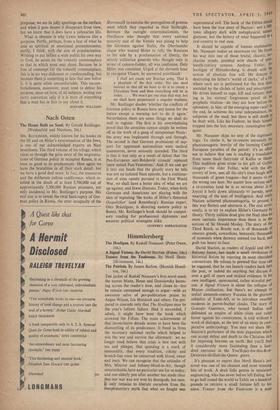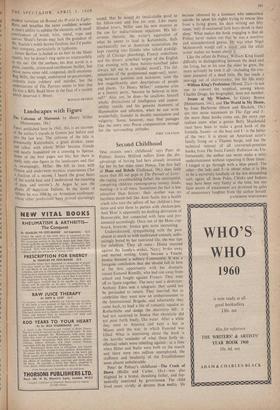Himmlersberg
THE jacket of Rudolf Nassauer's first novel sends the names Mann, Hesse and Dostoievsky boom- ing across the reader's bow, and closes in—lest he remain unstunned enough to argue—with an awesome salvo of pre-publication praise by Angus Wilson, Iris Murdoch and others. I'm pre- pared to concede only that The Hooligan may be the year's loftiest failure. Had it succeeded, I admit, it might have been the book which crowned the Fifties. The main achievement of that inconclusive decade seems to have been the dismantling of its predecessor. It freed us from the necessary national myths which helped to win the war and survive the aftermath: we no longer need believe that crisis is best met with tea and phlegm, that spending is a mark of immorality, that every tradition, colony and branch-line must be conserved with blood, sweat and tears. We can recognise that the attitudes of Mrs. Miniver and Johnny-Head-in-Air, though untarnishable,have no particular use for us today; and one elderly pen after another has made clear that our war was not won by demigods, but men. It only remains to liberate ourselves from the complementary myth that what we fought was
supernatural evil. The book of the Fifties should have been the true story of Nazism: not a tonic allegory dark with metaphysical, satanic glamour, but the history of what happened in a real country to real men.
It should be capable of human explanation. Mr. Nassauer makes an enormous try. He forces his way into one of those brutal, chaotic, sac- charine minds, jumbled with shards of nine' teenth-century systems. Andreas Febler, the hooligan of Himmlersberg, is drunk with the, notion of absolute free will. He dreams life where his father's 'world of clerks,' of a.lite where each act is performed for the first tune, unstated by the cliches of habit and prescription. He drives himself to rape, kill and torture; find' ing in his victims' forgiveness proof of his prophetic vitalism—do they not bow before the splendour, in him, of the emerging super-race? In the end, he achieves his total independence, the solipsism of the mad; but there is still death to be dealt with. Like his Fuehrer, he finds himself trapped into the last, necessary, meaningless con' quest.
Mr. Nassauer skips no step of the nightmare logic. To clothe it, he re-creates uncannily the, phantasmagoric brevity of the looming Central European parables of the period: it's an effort not to believe that one is reading a translation from some black fairy-tale of Kafka or Hesse. This tradition gives scope to his gift of Gothic imagery—the older Febler, wild with the dis- covery of love, sees all the city's trees laugh with thousands of green tongues—but it seems to 111e the wrong one here. No matter how serious such a re-creation (and he is as serious about it as Joyce) it boils down ultimately to parody, most wearying of the uses of intelligence. And while Nazism achieved phantasmagoria, to present It this way flatters and abstracts it. The real error, surely, is to try to explain Hitler's Germany by theory. Thirty million dead give the Nazi idea no more intrinsic importance than there is in the notions of Sir Oswald Mosley. The story of the Third Reich, as Brecht saw, is of thousands of obscure greeds, cowardices, betrayals; thousands of moments when decency seemed too hard, and guilt too heavy to face.
David Stacton, as readers of Segaki and 0,10 i Balcony know, has made a small revolution n historical fiction by rejecting its most cherished conventions. He refuses to pretend that time can be regained, that he can launch readers back into the past, or indeed do anything but discuss it, over a gulf of years and mislaid evidence, in his own intelligent, opinionated, rather scornful per- son. A Signal Victory is about the collapse of Mayan civilisation; 'but there's no attempt to unfurl sixteenth-century Yucatan in the glorious infidelity of Todd-AO, or to introduce swarthy moderns in parrot-feather cloaks. The story of Gonzalo Guerrero, who turned Indian and defended an empire of white cities and rainy forest against his countrymen, is told without a word of dialogue, as the text of an essay in com- parative anthropology. You may not share Mr. Stacton's preference of the stoic paganism which can accept defeat and death to the Christian itch for imposing heavens on earth. But you'll find it considerably more fascinating than a hun- dred exercises in the You'll-pay-for-this-Rob- Devereux-shrilled-the-Queen genre.
It's pleasant to report that Nevil Shute's last novel was one of his cleanest and most winning bits of work. A drab little genius in miniature engineering, who has never before left Ealing, has to go half round the world to Tahiti on a hundred pounds to retrieve a small fortune left to his niece. Trustee from the Toolroom is a neat Modern variation on Round the World in Eighty DoYs, and breathes the same confident wonder at man's ability to subdue the elements with small contrivances of wood, wire, metal, rope and canvas. Shute's heroes may lack the grandeur of Mr: Stacton's noble brown fatalists, but I'd prefer their company, particularly in typhoons. James Barlow is hailed as an heir to the Shute mantle, but he doesn't ring quite so trustworthily to my ear. On the surface, his first novel is a Plain, capable, crime-and-retribution thriller, but below move some odd, congested, shrill emotions. Reg Mills, the tough, embittered ex-paratrooper, commits train robbery and murder, but the undercurrent of The Patriots seems to hint that his was a Billy Budd blow in the face of a society which deserved it. Hmm.
RONALD BRYDEN



































 Previous page
Previous page